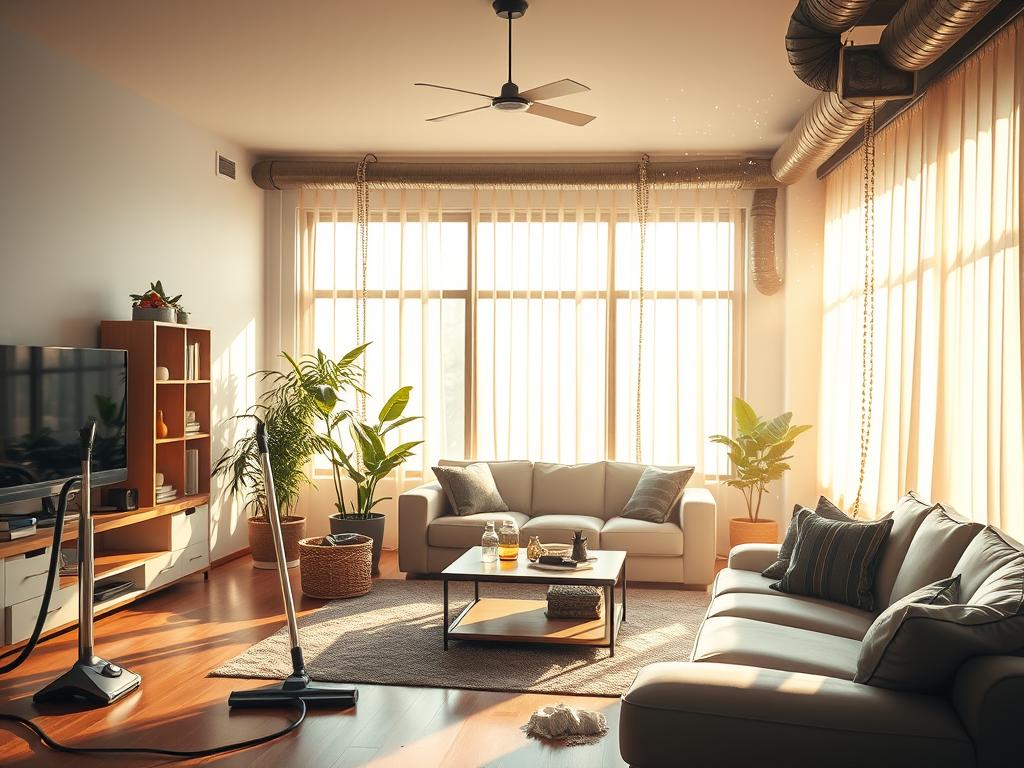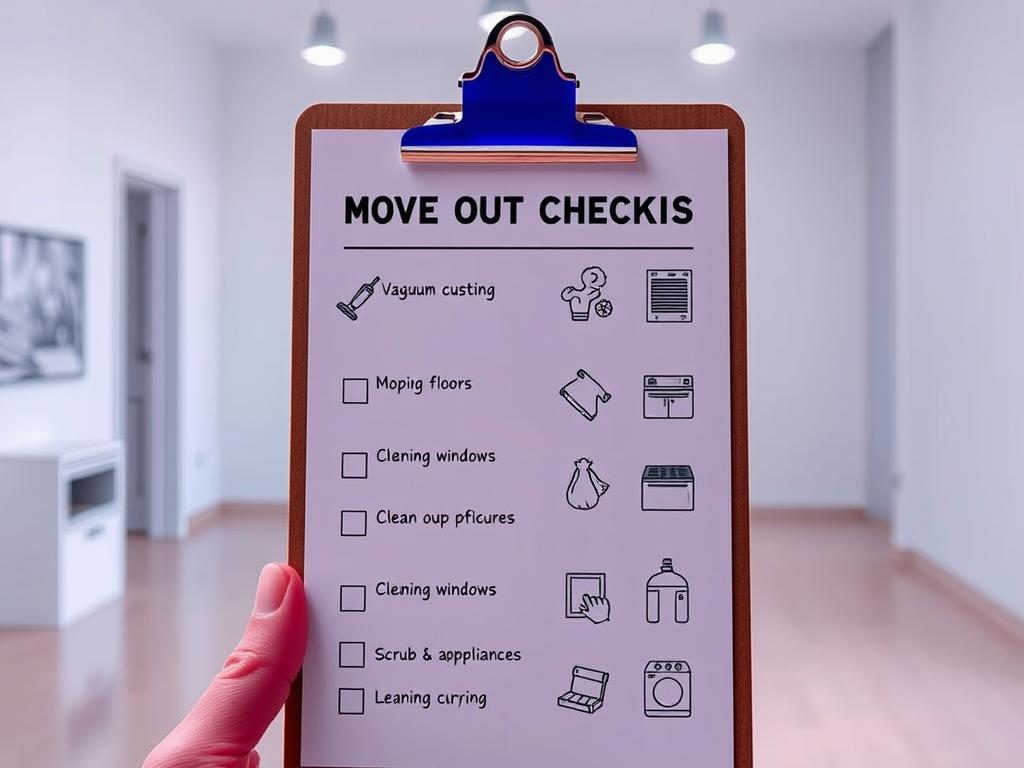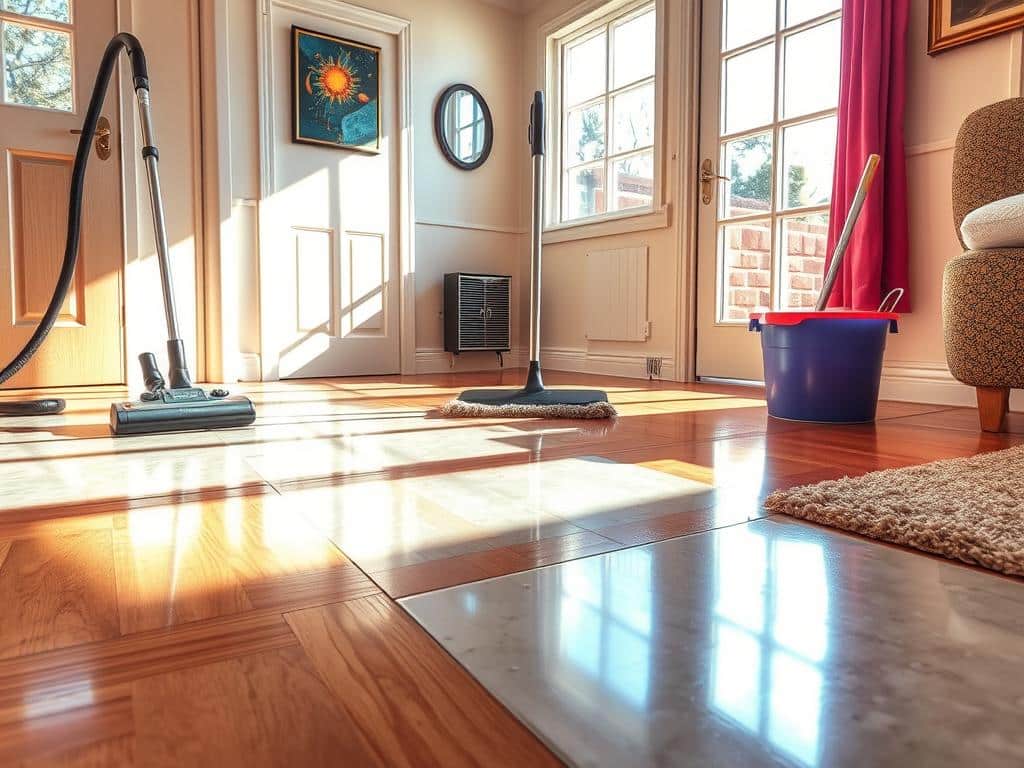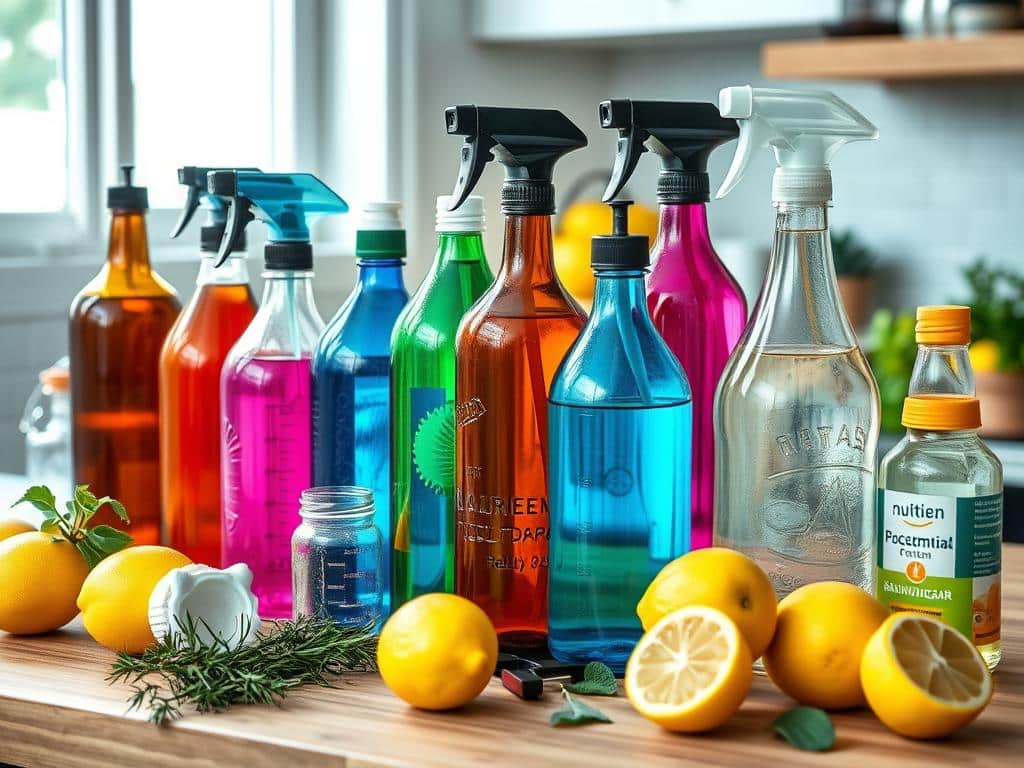
Keeping your home clean doesn’t mean you need harsh chemicals from the store. Homemade cleaning sprays can make your home sparkle and smell fresh. They use simple ingredients from your pantry. This makes them both good for the Earth and light on your wallet. You’ll love how these green cleaners make every room shine safely.
These natural cleaners use things like white vinegar, baking soda, and essential oils. So, you can mix up a cleaner for any job. Need to scrub tough grime? Combine baking soda with lemon juice. For shiny windows, mix vinegar with water. Adding essential oils, like lavender or lemon, fights germs and smells great.
One great thing about homemade sprays is they’re cheap. You can make most with three ingredients or fewer for under a dollar. This saves you money each time you clean. Plus, it cuts down on plastic waste, which is better for the planet.
These eco-friendly cleaners don’t have harsh chemicals. That makes them safer for your family and pets. They work on many surfaces without harming them. Just remember to label your homemade cleaners well to keep everyone safe. And never mix dangerous combos like ammonia and bleach.
Switching to these natural cleaning solutions is smart. It’s better for your budget, your health, and the Earth. Your house will be clean, fresh, and safe for everyone in it.
Essential Ingredients for DIY Cleaners
Making your own cleaning products supports green living. It also brings natural, powerful ingredients into your routine. These main components will change how you clean.
White Vinegar
Distilled white vinegar is key in homemade cleaners. At a 5% concentration, it cuts through grease and stains easily. It also stops mold growth. It’s perfect for all-purpose cleaners, tackling rust and dirt with its acidity.
Baking Soda
Baking soda is known for cleaning and deodorizing. It easily lifts proteins, fats, and pet messes. Its gentle abrasive nature means it cleans without scratching. It’s essential for eco-friendly cleaning.
Essential Oils
Essential oils do more than smell nice. Tea tree, lavender, eucalyptus, lemon, and lemongrass have antibacterial qualities. They make your cleaners deodorize naturally while bringing a fresh scent.
Isopropyl Alcohol
Isopropyl alcohol, 70% concentration, is great for glass cleaners. It dries fast, avoiding streaks, and shines surfaces. It’s a top choice for many DIY cleaning recipes.
Castile Soap
Castile soap comes from olive oil or vegetables. It’s mild but effective on most surfaces. In liquid or bar form, it removes dirt well. It’s a must-have for home care.
Scented All-Purpose Cleaner
Making your own all-purpose cleaner is simple. You just need white vinegar, water, fresh citrus rinds, and aromatic herbs. Lemon rind and rosemary sprigs are a great combo. They boost your cleaner’s power and leave behind a lovely scent.
To start, mix white vinegar and water equally in a spray bottle. Throw in the lemon rind and rosemary. Let them sit for a week. This method infuses your cleaner with citrus and is easy. Just label your bottles and use new containers for safety.
This DIY cleaner works well on mirrors, glass, and laminate. But, acidic cleaners shouldn’t touch unsealed granite or natural stone. Make sure it’s used properly.
For more variety, try orange rinds or cinnamon sticks. These make wonderful cleaners too. Learn more with these vinegar-based cleaner recipes. These DIY cleaners last about a month. Make small batches to keep them effective.
For a stronger cleaner, add essential oils like lavender or eucalyptus. They add antibacterial strength and more scent. These cleaners are effective and enjoyable to use.
If you love making your own cleaners, check out this guide. Your home will not only shine but smell amazing too.
DIY Deep Cleaning Solutions for Specific Surfaces
When cleaning various surfaces in your home, it’s smart to use safe, DIY cleaners. These are made for specific materials to clean well without damage.
Glass and Mirrors
To get your windows streak-free, mix water, white vinegar, and isopropyl alcohol. Use a microfiber cloth with this solution to wipe away smudges and make glass sparkle.
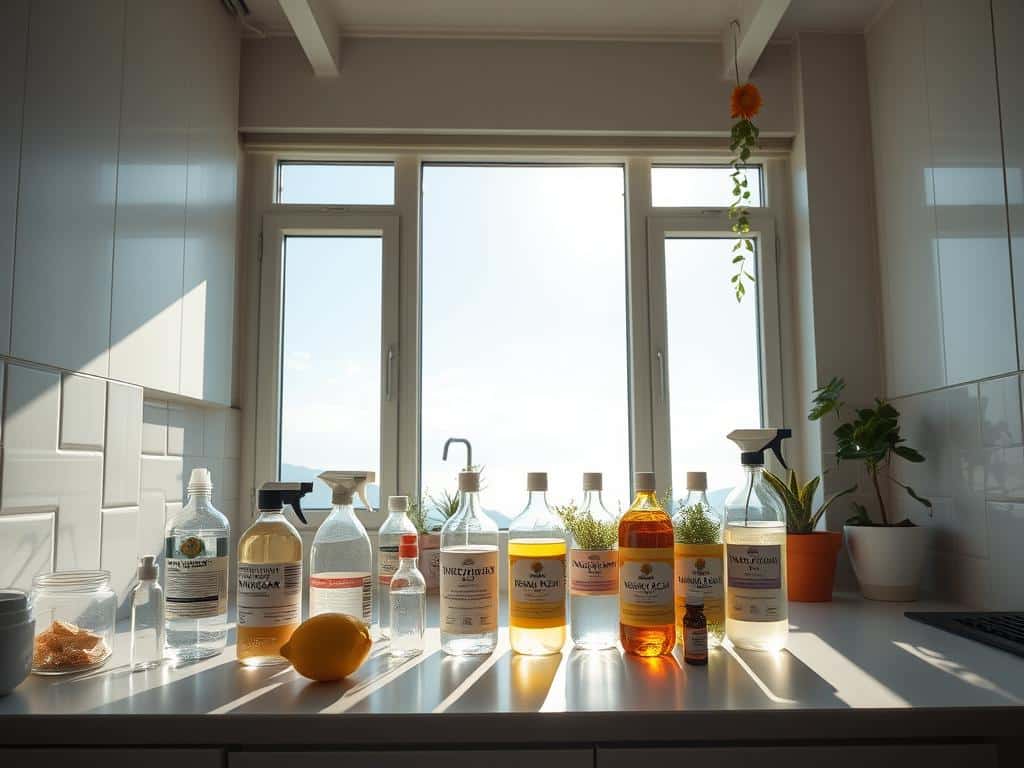
Natural Stone
Care for natural stone surfaces by cleaning them gently. A mix of rubbing alcohol, water, and a drop of dish soap works well. Avoid anything acidic to keep the stone safe.
Greasy Stovetops
For greasy stovetops, a mix of sudsy ammonia and water does the trick. It slices through grimy build-up. Just don’t use ammonia on aluminum to avoid damage.
- Use safe DIY surface cleaners tailored to each specific surface.
- Prepare streak-free window recipes for glass and mirrors.
- Utilize gentle natural stone cleaning methods.
- Apply powerful degreasing solutions for greasy stovetops.
Creating cleaners specific to each surface keeps your home clean and cared for. This takes little effort and saves money.
Effective Air Fresheners with Natural Ingredients
Creating your own air fresheners is great for a fresh, welcoming home. Avoid harmful chemicals found in 85% of store-bought fresheners. DIY options are safer, eliminate bad smells, and keep the air clean.
A simple homemade spray needs baking soda, essential oils, and water. Mix 1/2 cup baking soda with 15-20 drops of an essential oil. Add water to fill a spray bottle. Lavender or peppermint oils make your home smell nice and kill germs.
- Lavender: Known for its calming properties, it can help neutralize odors in areas such as bedrooms or living rooms.
- Peppermint: Its refreshing scent works well in bathrooms and kitchens, providing a clean and invigorating atmosphere.
- Lemon: Its natural acidity helps combat bacteria while imparting a fresh, citrusy aroma.
DYI fresheners also cut down on waste and are cheaper than buying them. You should refresh these natural scents every few weeks to keep your home smelling nice.
Simmer pots are a great way to keep your place smelling good. Just simmer fruits, herbs, and spices in water. It’s a low-cost method that makes your home smell wonderful all day.
Choosing these natural air fresheners means a healthier home for your family. Enjoy the benefits of natural ingredients.
Safety Tips for Mixing DIY Cleaners
Making sure you mix DIY cleaners safely is very important for a safe home. It’s key to follow safe cleaning tips to avoid dangerous chemical reactions. For example, never combine vinegar and bleach because it creates harmful chlorine gas. This gas is bad for your lungs and eyes.
It’s very important to correctly label homemade cleaners. List all the ingredients to prevent accidents. Always keep these cleaners away from children and pets following good storage advice.
Before using new DIY cleaners, test them in hidden spots. This ensures they are safe for your home. Learn more about safe cleaning techniques here.
Mixing the wrong chemicals can be very dangerous. For instance, ammonia and bleach create harmful vapors that can hurt your lungs and throat. Also, mixing hydrogen peroxide with vinegar makes peracetic acid. This can irritate your skin, eyes, and lungs. That’s why it’s crucial to follow DIY cleaning safety tips.
More people are choosing DIY natural cleaners today. However, accidents from unsafe chemical reactions are still happening. It’s essential to stick to safe cleaning methods. This will help avoid risks and keep your home clean and healthy.
Benefits of Homemade Cleaners
DIY cleaning offers many advantages, being friendly to your wallet is one. Making cleaners at home lets you save money. You just need cheap, common items like vinegar, baking soda, and essential oils. This approach cuts down on costs and packaging waste. It supports both your budget and the planet.
Cost-Effective
Homemade cleaners are great for saving money. You can use easy-to-find ingredients like white vinegar and baking soda for a good clean. Avoiding the cost of commercial products is a big plus. You won’t have to buy many different cleaners, which saves money in the long run. these natural options last longer and can keep you away from harmful chemicals.
Eco-Friendly
DIY cleaning is kind to the earth. It uses ingredients that don’t harm the environment, reducing pollution. Choosing natural cleaners helps the planet stay healthy. More people are picking safe surface cleaners, moving towards a cleaner world. This also cuts down on air pollution inside the home, making it better for everyone.
Health Advantages
Knowing the dangers of chemical cleaners is important for your health. These chemicals can cause breathing issues, skin problems, and other health risks. However, natural homemade cleaners are much safer. They don’t have harmful toxins, which means fewer allergies and accidents. Following tips from experts like Carolyn Forté of Good Housekeeping, you ensure your cleaning is both safe and effective.
Using homemade cleaners offers a lot of wins. They are cheap, eco-friendly, and better for your health. Your home becomes safer, cleaner, and more budget-friendly as you keep using DIY solutions.

